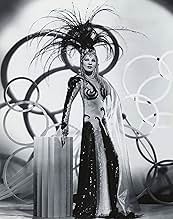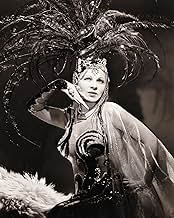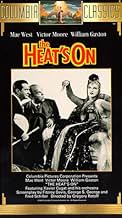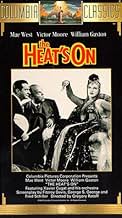अपनी भाषा में प्लॉट जोड़ेंWhen his biggest star joins a rival's show, a Broadway producer bluffs and schemes to get her back.When his biggest star joins a rival's show, a Broadway producer bluffs and schemes to get her back.When his biggest star joins a rival's show, a Broadway producer bluffs and schemes to get her back.
Leon Belasco
- Shore - the Agent
- (बिना क्रेडिट के)
Beatrice Blinn
- Babette
- (बिना क्रेडिट के)
फ़ीचर्ड समीक्षाएं
I'm a big fan of Mae West, and I waited for years to see this insignificant, forgettable little movie. Although I knew it had gotten bad reviews at the time of its release--- and West herself didn't like it any more than the critics did--- I thought there still might be something in it worth seeing, since it holds such an important place in her career: this was the final movie of her 1930s/1940s "movie star" period. After it was done, West returned to live stage work, recording sessions, and of course her famous nightclub act of the 1950s. She was not to make another film for 27 years (at which time she did the rather infamous "Myra Breckinredge" in 1970).
Seeing "The Heat's On" is an exercise in tedium. I had to literally struggle to stay awake during it. It's not that it's all that horrendously "bad"--- heck, even bad movies can be entertaining for the wrong reasons. This one is just....empty. Completely vapid and forgettable. It's easy to understand why Mae West practically disowned this movie.
The main thing wrong with it is that she isn't in it nearly enough. For the entire first hour, I swear that West had about 6 minutes of total screen time, scattered throughout in a series of VERY short "blink and you'll miss it" scenes. She's got more charisma and screen presence, by far, than anybody else in this thing--- when she's on, you can't take your eyes off her. But you hardly get to see her! Giving West more screen time would have improved this movie immensely, and it's a mystery to me why director Gregory Ratoff didn't understand that.
What makes her absence from the screen even more frustrating, if not downright puzzling, is that so much of this movie is a revue/type *musical* (in neon lights), the type of film that could have shown her at her absolute best. But instead you get one lame song after the other filling the screen; there are singers, dancers, production numbers, showgirls, Latin-flavored guitarists, even a boogie-woogie pianist/singer (blues and jazz great Hazel Scott, playing herself). They all come in, do their thing, leave, and it's on to the next song. With the singular exception of Scott, who is wonderful--- all of this is absolutely and completely forgettable. Most of the singers, the dancers, the songs, the movie itself: it's "B"-grade material at best. We aren't talking MGM-quality here, folks.
Watching this parade of musical mediocrities go by, all you can think of the entire time is "Where IS Mae West??! Why don't they bring her on?" But it never happens until the very end, at which time you'll be practically asleep if you've managed to sit through it all up to that point. It's hard to imagine who might be a fan of this picture.
For what it's worth, West does look pretty good. Always proud of her youthful appearance, she was 50 years old here, but she looks maybe 40-ish, and she's dressed in stylish, contemporary clothes for one of the very few times in her screen career. (Well, except for her very first musical number, in which--- amusingly--- she's in her trademark "gay 90s" garb, looking much like she did in her earlier films).
The story--- what flimsy plot there is of it--- has something to do with Broadway musical star Fay Lawrence (West) getting funding for her next show, and having producers fight over her. But the main point of this movie, and the most amount of screen time, is devoted to the endlessly boring musical numbers. Gentle, befuddled Victor Moore is the primary male lead; and a YOUNG Lloyd Bridges--- yes, he was young once!--- has a featured part as a soldier engaged to Moore's niece.
Not a bad movie, just a boring one, and it missed the boat all around. Mae West deserved better.
Seeing "The Heat's On" is an exercise in tedium. I had to literally struggle to stay awake during it. It's not that it's all that horrendously "bad"--- heck, even bad movies can be entertaining for the wrong reasons. This one is just....empty. Completely vapid and forgettable. It's easy to understand why Mae West practically disowned this movie.
The main thing wrong with it is that she isn't in it nearly enough. For the entire first hour, I swear that West had about 6 minutes of total screen time, scattered throughout in a series of VERY short "blink and you'll miss it" scenes. She's got more charisma and screen presence, by far, than anybody else in this thing--- when she's on, you can't take your eyes off her. But you hardly get to see her! Giving West more screen time would have improved this movie immensely, and it's a mystery to me why director Gregory Ratoff didn't understand that.
What makes her absence from the screen even more frustrating, if not downright puzzling, is that so much of this movie is a revue/type *musical* (in neon lights), the type of film that could have shown her at her absolute best. But instead you get one lame song after the other filling the screen; there are singers, dancers, production numbers, showgirls, Latin-flavored guitarists, even a boogie-woogie pianist/singer (blues and jazz great Hazel Scott, playing herself). They all come in, do their thing, leave, and it's on to the next song. With the singular exception of Scott, who is wonderful--- all of this is absolutely and completely forgettable. Most of the singers, the dancers, the songs, the movie itself: it's "B"-grade material at best. We aren't talking MGM-quality here, folks.
Watching this parade of musical mediocrities go by, all you can think of the entire time is "Where IS Mae West??! Why don't they bring her on?" But it never happens until the very end, at which time you'll be practically asleep if you've managed to sit through it all up to that point. It's hard to imagine who might be a fan of this picture.
For what it's worth, West does look pretty good. Always proud of her youthful appearance, she was 50 years old here, but she looks maybe 40-ish, and she's dressed in stylish, contemporary clothes for one of the very few times in her screen career. (Well, except for her very first musical number, in which--- amusingly--- she's in her trademark "gay 90s" garb, looking much like she did in her earlier films).
The story--- what flimsy plot there is of it--- has something to do with Broadway musical star Fay Lawrence (West) getting funding for her next show, and having producers fight over her. But the main point of this movie, and the most amount of screen time, is devoted to the endlessly boring musical numbers. Gentle, befuddled Victor Moore is the primary male lead; and a YOUNG Lloyd Bridges--- yes, he was young once!--- has a featured part as a soldier engaged to Moore's niece.
Not a bad movie, just a boring one, and it missed the boat all around. Mae West deserved better.
Broadway star Fay Lawrence (Mae West) wants out of her contract with producer Tony Ferris (William Gaxton). She can do it if the show does badly. A society foundation shuts them down and she jumps to rival Forrest Stanton. Tony is willing to do anything to get her back including using the same foundation and its hapless vice president Hubert Bainbridge (Victor Moore) who wants to help his niece's performing ambitions.
This is Mae West's last theatrical release before making a semi-return some three decades later. She delivers her style of comedy with less sexuality. There is some music. The songs may be appealing to some. For most of this, the lead character is actually Ferris. He's not that compelling or appealing with all his scheming. If this was written by Mae West, she would probably be the lead from the start. She does take over in the last act and that's a good section. If only the movie has more of those.
This is Mae West's last theatrical release before making a semi-return some three decades later. She delivers her style of comedy with less sexuality. There is some music. The songs may be appealing to some. For most of this, the lead character is actually Ferris. He's not that compelling or appealing with all his scheming. If this was written by Mae West, she would probably be the lead from the start. She does take over in the last act and that's a good section. If only the movie has more of those.
Although Mae West receives first billing, she is not on screen long enough to make this misfire worth seeing. Even when she is on display and looking svelte and glamorous at 50, her lines lack the double-entendres and sly delivery of her best work. The silly goings on in this back-stage "comedy" revolve around financing a theatrical production with money from a blue-nose group whose goal is to suppress such shows. The plot is muddled at best, ridiculous at worst, and the cast lacks either a romantic lead such as Cary Grant or a comic like W.C. Fields for Miss West to play off. The production numbers for the most part are forgettable, even when Mae West delivers the songs. The one exception is the dazzling piano playing by Hazel Scott. Her number with two pianos is nothing short of astonishing and almost makes the dreck one has to endure before her appearance almost bearable. Unfortunately, Scott has only two numbers, but mercifully the film ends rather abruptly not long after she exits the screen. "The Heat's On" is certainly an ironically mis-titled film considering the heat that West generated in her early work, and the movie is only for die-hard West fans who are interested in seeing everything that she appeared in. Entertainment seekers and non-West fans beware.
5tavm
Well, after 40 years of reading about this movie, my curiosity has finally been settled! Her last movie before this one-My Little Chickadee-having been released three years previous, Mae West makes one more picture before taking a 27-year sabbatical from Hollywood. However, because she didn't write her material like before, she doesn't have much witty lines and in fact, has small screen time despite her above-the-title billing which she shared with William Gaxton and Victor Moore, both of whom have more scenes. It's with Moore that Ms. West has her one good scene with as she manages to get him drunk while he reveals the crux of the plot. Otherwise, this film is just an excuse to provide musical numbers of either Mae, Xavier Cugat and his Orchestra, or the excellent singing and piano skills of Hazel Scott and excellent Ms. Scott really is! If anyone makes this picture worth seeing, she does! P.S. Lloyd Bridges has a small role as a soldier who visits his girlfriend played by Mary Roche who's only appearance on film this was.
A real dog, independently made by Gregory Ratoff but released by Columbia, from a script that could have been written on the back of an envelope, about Broadway producer William Gaxton trying to keep Mae West in his show, which is actually a Latin American revue featuring lots of Xavier Cugat. Mae is, as many have noted, allotted insufficient screen time, and when she's on, her lines mostly thud; plus, she looks on the zaftig side, and understandably bored. William Gaxton was a huge star on the stage, originating roles in such notable musicals as "A Connecticut Yankee," "Anything Goes," and "Of Thee I Sing," but he's a blank on film; he's somewhat better, in a similar role, in "Best Foot Forward" the same year at MGM. Victor Moore, a frequent stage partner of Gaxton's, does his usual bumbling- inarticulate-hick thing that some people find charming, and sings an absolutely dreadful song about victory gardens that can't even have had much impact in 1943. The songs are by Jule Styne and Sammy Cahn and other hands, but they're dull, and the supporting cast is no- name, though Lloyd Bridges turns up as the ingenue's GI sweetheart, and Hazel Scott has a couple of specialty numbers that show her off to decent advantage. There were lots of barely- plotted B wartime musicals such as this, but most don't get shown, either through rights tangles or sheer disinterest. This one shows what a haphazard genre it was at the time.
क्या आपको पता है
- ट्रिवियाThis was Mae West's final film until Myra Breckinridge (1970) 27 years later.
- गूफ़On a wall of a producer's office is a presumably old publicity shot of Fay wearing an elaborate headdress that she doesn't actually wear until she performs a musical number later in film for an entirely new production staged by rival producer.
- भाव
Fay Lawrence: [In the finale, Hello, Mi Amigo:] If you want things put in order, come and see me, south of the border.
- साउंडट्रैकI'm Just a Stranger in Town
(1943)
Music by Jay Gorney
Lyrics by Henry Myers and Edward Eliscu
Copyright 1944 by Mills Music Inc.
Performed by Mae West (uncredited) in the show "Indiscretions"
टॉप पसंद
रेटिंग देने के लिए साइन-इन करें और वैयक्तिकृत सुझावों के लिए वॉचलिस्ट करें
विवरण
- चलने की अवधि1 घंटा 19 मिनट
- रंग
- पक्ष अनुपात
- 1.37 : 1
इस पेज में योगदान दें
किसी बदलाव का सुझाव दें या अनुपलब्ध कॉन्टेंट जोड़ें




































